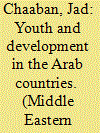| Srl | Item |
| 1 |
ID:
101170


|
|
|
|
|
| Publication |
2010.
|
| Summary/Abstract |
The purpose of this article is twofold. First, we aim to evaluate the records of executive branches of the Lebanese government that are involved in public social spending in terms of their ability to respond to need. Second, we attempt to uncover the criteria underlying the distribution of public social spending. The allocation of funds across sectors and administrative districts is evaluated according to a vector of the socioeconomic characteristics of each locality thought to be of relevance. We find that the association between need and spending is, at best, very loose. When we use the geographical distribution of spending and voting data from each locality to estimate each religious sect's share of public spending, we find a striking conformity between the sectarian composition of the population and each sect's estimated share of national public spending. The logic of the disbursement of public funds and the mechanism underlying the observed one-man one-dollar distribution rule-a rule with primacy over health, education, and infrastructure needs as well as imbalances across regions-is that distribution be balanced across sects.
|
|
|
|
|
|
|
|
|
|
|
|
|
|
|
|
| 2 |
ID:
086711


|
|
|
|
|
| Publication |
2009.
|
| Summary/Abstract |
Arab countries are currently faced with the highest youth cohort in their modern history. Arab youth are not only more numerous, but they are also more educated and marrying at a later age than before. One in each three young Arab persons is unemployed, and gender bias against young women's university enrolment and labour participation is pervasive. Against a backdrop of rising frustration among their youth, Arab policymakers need to act quickly. A revision of the social and economic contract towards more and better provision of public goods is central to addressing the challenges faced by the Arab youth.
|
|
|
|
|
|
|
|
|
|
|
|
|
|
|
|